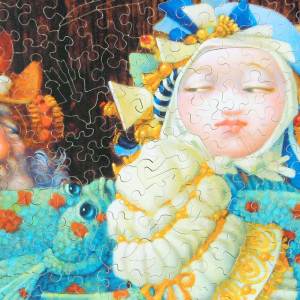Having done many puzzles over my lifetime, I have often wondered what it is about puzzles that people enjoy. I am sure if someone took a survey of a 100 serious puzzlers there would be a range of answers, from filling time to an alternative to watching TV to a form of meditation. However, it’s a very interesting hobby in a lot of ways. Unless you are someone that glues completed puzzles to boards for display (and I hope that is not the case with the classic wooden ones!!!), then beyond a sense of accomplishment, there isn’t a lot of reward, other than maybe taking a photo, putting the pieces back in the box and, perhaps, doing it again another day or year.
 Given this unusual activity, my feeling is it’s a lot like running a marathon. Let’s take a look at what you need to do prepare and (hopefully) complete a marathon. There are several stages of training. Depending how in shape you are, you may start out walking or slowly running short distances, and then gradually moving up to longer runs in preparation for that 26+ miles of muscle burning on the big day of the event. To be able to complete a marathon you need stamina and focus (both while training and during the race). A lot of it is a mental game. Maybe that extra day of running each week, instead of sleeping in, gives you the strength to complete the race.
Given this unusual activity, my feeling is it’s a lot like running a marathon. Let’s take a look at what you need to do prepare and (hopefully) complete a marathon. There are several stages of training. Depending how in shape you are, you may start out walking or slowly running short distances, and then gradually moving up to longer runs in preparation for that 26+ miles of muscle burning on the big day of the event. To be able to complete a marathon you need stamina and focus (both while training and during the race). A lot of it is a mental game. Maybe that extra day of running each week, instead of sleeping in, gives you the strength to complete the race.
It may seem like a stretch to compare a marathon to completing a puzzle, but I think that a lot of the same reasons that some people puzzle are what drive people to run, and eventually move up to marathons. Obviously from a physical activity level they are almost polar opposites on the fitness spectrum. However, when it comes to using your brain, the similarities begin to come into play.
When you are a kid, and you begin doing little wood puzzles with the pegs and cutout shapes, that is the beginning of your training to do complicated puzzles. As you progress to more complicated puzzles, like running, you get faster at completing the puzzles, as well look to try harder ones that present more of a challenge (going up hills instead of running flat). Much like running, in that most people who have not run before will do short 5k or similar races and build up to a marathon. Additionally putting a puzzle together takes a lot of focus, patience and training in order to get better, just like with running. Then if you get really good, you may eventually move to Stave Trick puzzles which are like running an ultra-marathon. Whatever level you are in your puzzling endeavors, it’s a an accomplishment to get that last piece in and move past the finish line, only to pull the whole thing apart and put it away for another day.
